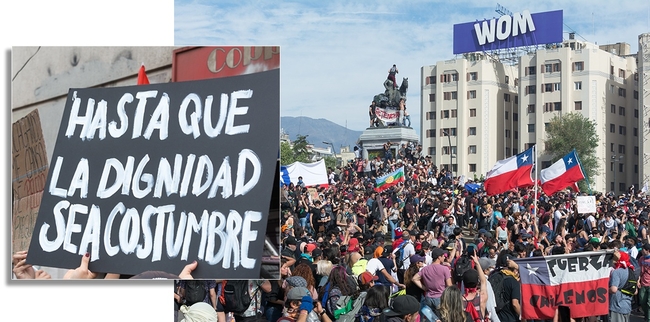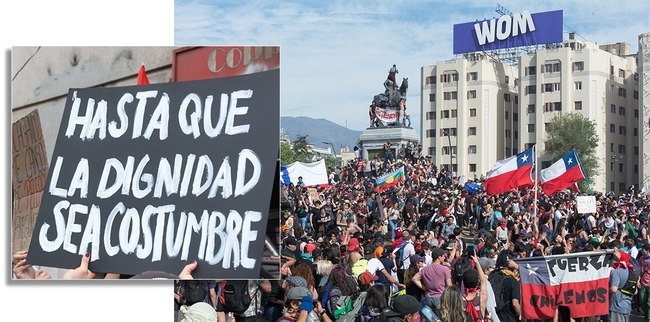Latin America — the enduring flame of hope
Morning Star | Thursday, 27 October 2022 | Click here for original article

Ahead of the Latin America Conference 2023 in January, Richard Burgon MP looks at the 'second pink tide,' a new wave of social progress across the continent — and why solidarity remains as important as ever
It seems not a month goes by without a new crisis hitting ordinary people all over the world. From the cost-of-living emergency to the inequality crisis and climate chaos, it is clear that our neoliberal model is failing the vast majority of people.
Each crisis should not be viewed in isolation but as a sign of how neoliberalism itself is the crisis. That means we need to replace the whole system with an alternative that better serves people. On this, Latin America offers important lessons for progressives.
Birthplace and graveyard of neoliberalism
Latin America was the first region subjected to the brutal neoliberal experiment. Neoliberalism emerged at the barrel of the gun via a military coup against Salvador Allende in Chile in 1973 and was then enforced via a cruel dictatorship.
The laboratory of this experiment was soon extended across the whole region and into the US and Britain by Ronald Reagan and Margaret Thatcher. While the 1 per cent have enjoyed its fruits, neoliberalism has proven to be an unremitting disaster for the vast majority of people in Latin America, with poverty soaring, key services sold off and inequality deepening. As economist Mark Weisbrot explains, from 1980-2000, Latin America suffered its worst long-term economic growth failure for at least a century.
As a result of this social catastrophe and the determined struggles of millions of people Latin America emerged as the first area to directly challenge these policies. With the “pink tide” of left governments elected at the start of the century, Latin America has fought to be the graveyard — as well as the birthplace — of neoliberalism.
At a time when many were declaring “the end of history” and the final triumph of the free market, leaders such as Lula Da Silva in Brazil, Evo Morales in Bolivia and Rafael Correa in Ecuador and many others emerged with their alternatives.
The overall achievements of the Latin American left are significant. Many tens of millions of people were lifted out of poverty. Others benefited from increased public investment in education and healthcare, increases in minimum wages, massive house-building programmes or by having a public pension for the first time.
Of course, much more remains to be done — as even now, Latin America remains the most unequal continent on Earth. But overall, these progressive governments delivered important progress by intervening on behalf of the majority and not just leaving everything to market forces.
A second pink tide
We are now in a second wave of the pink tide of leftist governments. In recent years left governments have won elections in Mexico, Argentina and Honduras. Gabriel Boric has become Chile’s president on the back of grassroots uprisings, in the face of intense repression, that broke the neoliberal consensus there. And just a few months ago Gustavo Petro won in Colombia, becoming the nation’s first-ever leftist leader.
Tony Benn spoke of two flames in the human heart: the flame of anger against injustice and the flame of hope you can build a better world. For me, this new wave of progressive governments gives us hope.
If the left can achieve victories in Chile, the birthplace of neoliberalism, and in Colombia with its record of human rights abuses, then we should take great hope that we can achieve them anywhere in the world.
When I visited Colombia, I learned how it was the most dangerous place in the world to be a trade unionist and how death squads would regularly target environmental activists, black activists and journalists.
Now, in contrast, President Petro is promising to tackle Colombia’s deep social and economic inequalities through greater social spending, funded by hiking taxes on the rich and putting an end to corporate tax breaks.
He has placed combatting climate change at the core of his agenda and is planning to reduce the country’s reliance on fossil fuels. He is committed to kick-starting the country’s peace process to end over half a century of armed conflict.
I recently met with Colombian senator Maria Jose Pizarro, a member of Petro’s Historic Pact party, and she made clear that Colombia, through this agenda, hopes to be an example of progress in the world.
It is essential that progressives learn from such developments and seek to draw lessons that can be applied in our own, admittedly very different, circumstances. But it is also vital that we offer our solidarity against the fightback from the old elites reluctant to cede a single inch to social progress.
Backlash of the elites
While Latin America’s pink tide of progressive governments over the last 20 or so years has taken many forms — each one reflective of the specific circumstances in which their country found itself — all had one thing in common: the huge resistance they met.
Just as the Cuban revolution was met with a murderous blockade that has cost the island many tens of billions of dollars and just as Salvador Allende was ousted in a bloody military coup in Chile, every step forward in Latin America this century has faced a backlash from the elites.
The reason is clear: every gain in Latin America has made has only been possible by striking a blow against the rule of local oligarchies. And each has also weakened the decades-long US domination of the region that has sown poverty, inequality, military conflict and widespread suffering in an area US elites regard as their own backyard. These powerful forces do not give up easily.
It’s worth reminding ourselves of the pressures that the left governments have faced. In the 20th century there were 80 coups in Latin America and the Caribbean — 63 of those coups were military-led. This has continued into the 21st century: there was the attempted military coup against Hugo Chavez in 2002, captured in the wonderful and inspiring documentary The Revolution Will Not Be Televised. There was a successful military coup in Honduras in 2009 that ousted Manuel Zelaya and then a coup against Evo Morales in 2019.
While military interventions still take place, as happened in Bolivia, they are thankfully less common. One alternative strategy has been the use of sanctions to try to enact regime change by strangling a country’s economy.
Cuba has been the decades-long victim of this, with a tremendous impact on its economic development. This even led to lives being lost during Covid as the blockade prevented the delivery of emergency medical supplies and delayed the roll-out of the incredible achievement which was Cuba’s own vaccine.
Instead of the cruel and illegal blockade being ended in Cuba, there are deep concerns that this strategy of collective punishment through sanctions is being extended in the region.
For example, UN Special Rapporteur Alena Douhan has criticised the “devastating effect” of the unilateral sanctions against Venezuela applied by the US since 2015, and called for them to be dropped, as they have “exacerbated the pre-existing economic and social crisis, with a devastating effect on the entire population, especially those living in poverty, women, children, the elderly, people with disabilities.”
Douhan also criticised the British government’s refusal to allow the Venezuelan government to access its own gold assets, frozen in the Bank of England, “to buy medicine, vaccines, protective kits and medical equipment through third-party institutions” and has called for this to end.
Another new strategy of the elites has been to oust leaders via judicial and parliamentary coups. This strategy, known as “lawfare,” removed the president of Paraguay in 2012 and then Brazil’s first female president Dilma Rousseff in 2016.
In Ecuador lawfare has been used to force former president Rafael Correa, as well as other leading figures of the left that ran Ecuador so successfully, into exile for fear of being jailed on trumped-up charges — as has already happened to Correa’s former vice-president.
But the most infamous example of lawfare has been the campaign against Lula da Silva in Brazil. Lula previously served as Brazil’s president after being elected as the country’s first working-class leader earlier this century.
When he left office in 2011, he had record-high approval ratings of 83 per cent, the result of his government’s success in reducing poverty and addressing social inequality.
Lula was favourite to win the 2018 presidential election until he was arrested and jailed on trumped-up charges orchestrated by powerful elites in Brazil and Washington. That injustice opened the door to the election of the far-right President Jair Bolsonaro, a strong supporter of Brazil’s past military dictatorship under which he had served as a military officer.
As I write, Brazilians are about to choose their next president in a run-off between Lula and Bolsonaro. Lula had a first-round lead of over six million votes and a Lula victory looks likely. But all progressives will need to be alert to Bolsonaro seeking to undermine Brazil’s democracy to prevent that and perhaps even obstructing the peaceful transfer of power should Lula triumph again.
If he does, it will transform not only the lives of tens of millions of Brazilians but the political situation across Latin America. With the government of the region’s largest economy and highest population seeking to pursue regional integration and social development, this would strengthen progressives in every corner of the continent.
But either way, one thing is clear: despite the predictions not so long ago of the death of the pink tide, the Latin American left continues to challenge for power and continues to offer a beacon of hope for progress the world over.
Let’s learn from Latin America. But most importantly, as we have done from fighting the blockade on Cuba to opposing the murders of Colombian trade unionists and challenging coups and lawfare, let’s continue to do our bit to stand shoulder to shoulder in solidarity.
Richard Burgon is MP for Leeds East — follow him on Twitter @RichardBurgon.
The Latin America Conference 2023 will be held in London, January 28 — for more information visit www.latinamericaconference.co.uk.







